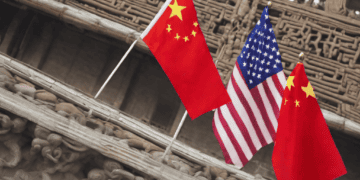In recent developments, the Chinese Ministry of Commerce expressed strong criticism towards the United States, labeling Washington as a “trade bully” responsible for initiating the “largest trade war in economic history.” This statement was released shortly after the U.S. began imposing 25 percent tariffs on $34 billion worth of Chinese imports, to which Beijing responded in a reciprocal manner. The Chinese ministry spokesperson vowed to take action at the World Trade Organization and collaborate with other countries to defend the principles of free trade.
China argues that the U.S. tariffs will have a negative impact on American companies and consumers, asserting that they are counterproductive and damaging. Meanwhile, various sectors, including manufacturers and retailers, are urging President Donald Trump to seek a prompt resolution to the trade war with China. The National Association of Manufacturers’ President and CEO, Jay Timmons, emphasized the importance of returning to the negotiating table and pursuing a trade agreement that can positively redefine the U.S.–China economic relationship. Timmons believes that tariffs alone will not solve the existing issues in China, and instead, they may trigger retaliation and further tariffs.
While many business groups support pressuring China to address concerns regarding intellectual property, they express concerns that the tariffs will harm trade between the two countries without effectively persuading Beijing to modify its policies. These groups advocate for a multilateral approach to exert pressure on China, but the imposition of tariffs on steel and aluminum exports from various allies by the Trump administration has strained relationships.
The counter-tariffs imposed by Beijing in response to the U.S. tariffs are expected to heavily impact farmers who export soybeans and pork to China, as it is a crucial market with a growing middle class. The threat of additional tariffs from China has added to the uncertainty faced by American farmers and families, particularly following Canada’s recent tariffs on U.S. products. This has raised concerns among organizations such as Americans for Farmers and Families, which opposes Trump’s trade policies.
Looking ahead, the Trump administration is preparing to impose a 25 percent duty on an additional $16 billion worth of Chinese goods as early as August, and China is expected to respond in kind. Furthermore, President Trump has expressed intentions to target another $200 billion worth of Chinese exports with tariffs.
The ongoing trade dispute between China and the U.S. has significant implications for global trade and supply chains. The actions of both countries will not only impact their own economies but also have far-reaching consequences for businesses and consumers worldwide.
Discover comprehensive supply chain report news insights at The Supply Chain Report. For international trade resources, visit ADAMftd.com.
#ChinaUSTradeWar #TradeDispute #GlobalTrade #USChinaTariffs #FreeTrade #TradeBullying #IntellectualProperty #ManufacturingImpact #FarmersUnderPressure #SoybeanTariffs #SteelAndAluminumTariffs #TariffRetaliation #WorldTradeOrganization #EconomicImpact #SupplyChainChallenges #TrumpTariffs #BeijingCountertariffs #USManufacturers #TradeNegotiations #TradePolicy #GlobalEconomy















